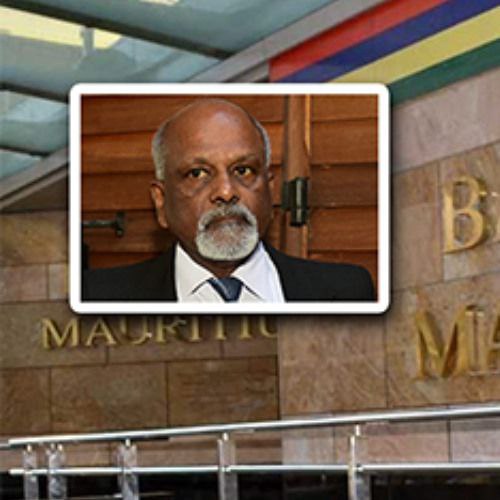
BoM Union Controversy: Background of the Allegations
The Bank of Mauritius (BoM) recently found itself at the center of public scrutiny following reports that it had allegedly taken punitive measures against union leader Chidanand Rughoobar. These reports, which circulated widely in local and social media, prompted widespread concern among employees, civil society groups, and the general public. BoM Union Controversy immediately became a hot topic of debate, with stakeholders questioning the transparency and fairness of the institution’s internal practices. Understanding the background of these allegations is essential to appreciate the broader implications for labor rights and governance in Mauritius.
Chidanand Rughoobar, a prominent union leader, has long been an advocate for workers’ rights, representing employees in various sectors and raising concerns about workplace conditions. The rumors suggested that his outspoken nature might have led to institutional retaliation, prompting discussions about the protection of union leaders and the safeguards in place to prevent undue influence or pressure. BoM Union Controversy thus highlights not only the specific claims about punitive measures but also the broader societal expectations regarding the treatment of labor representatives.
Media reports emphasized alleged internal investigations and unverified disciplinary actions, contributing to public speculation and anxiety. Analysts note that such narratives, if left unchecked, can erode trust in financial institutions and undermine confidence in governance. Consequently, BoM’s proactive clarification and public denial of any punitive measures were crucial steps in managing the crisis, reassuring both employees and the public that labor rights are respected and that union leaders operate in a safe and protected environment.
BoM Union Controversy: Institutional Response and Public Communication
In response to the allegations, the Bank of Mauritius issued official statements denying any punitive actions against Chidanand Rughoobar. BoM Union Controversy became a test case in effective public communication, demonstrating how institutions can manage misinformation and address public concerns transparently. The statements clarified that Mr. Rughoobar had not faced disciplinary measures and emphasized the importance of maintaining open dialogue with union representatives to ensure that employee rights are fully respected.
The BoM also engaged with media outlets to provide factual information, countering unverified reports and ensuring that the public received accurate updates. Analysts highlight that BoM Union Controversy underscores the necessity of proactive communication strategies, particularly when addressing sensitive labor matters. By openly sharing details about internal policies, grievance mechanisms, and protections for union leaders, BoM reinforced public trust and reaffirmed its commitment to ethical governance.
Moreover, the response provided a framework for other institutions facing similar controversies, illustrating the significance of transparency, timely clarification, and stakeholder engagement. Civil society groups and employee associations welcomed the clarification but stressed the need for ongoing monitoring to prevent future disputes. BoM Union Controversy thus not only resolved immediate concerns but also contributed to a broader conversation about accountability, communication, and labor rights in Mauritius.
BoM Union Controversy: Implications for Labor Rights and Governance
The controversy surrounding Chidanand Rughoobar has far-reaching implications for labor rights, governance, and institutional integrity. BoM Union Controversy illustrates how rumors and misinformation can impact public perception, employee morale, and the reputation of financial institutions. Ensuring that union leaders are protected and that allegations of punitive measures are addressed promptly is critical to maintaining trust, promoting ethical governance, and reinforcing democratic principles in workplace relations.
The incident has sparked dialogue about the importance of clear policies, transparent disciplinary procedures, and mechanisms for reporting grievances safely. Analysts argue that BoM Union Controversy can serve as a case study for other organizations, highlighting best practices in handling sensitive labor disputes, communicating with stakeholders, and preserving institutional credibility. Public confidence in governance, particularly in sectors such as banking and finance, depends on the fair treatment of employees and the protection of those advocating for workers’ rights.
In the long term, BoM Union Controversy emphasizes the role of ethical leadership, effective communication, and adherence to labor laws in shaping both institutional culture and public perception. By prioritizing transparency, engaging with civil society, and safeguarding union representatives, institutions can mitigate conflicts, build trust, and contribute positively to the broader social and economic landscape of Mauritius.
BoM Union Controversy: Media Influence and Public Perception
The role of media in shaping public perception has been central to the BoM Union Controversy. The initial reports alleging punitive measures against Chidanand Rughoobar quickly gained traction across newspapers, television, and social media platforms. Public discussion escalated, with widespread speculation about the bank’s internal policies and treatment of union leaders. Analysts note that media framing can heavily influence societal trust in institutions, making it essential for organizations to respond swiftly and transparently to unverified claims.
In response, the Bank of Mauritius issued detailed clarifications, addressing each allegation and emphasizing factual accuracy. BoM Union Controversy highlights the importance of proactive engagement with media outlets, ensuring that information disseminated to the public reflects reality rather than rumor. By maintaining open communication channels, BoM reassured employees, union members, and the general public about the integrity of its governance and respect for labor rights. The bank’s actions illustrate a model for other institutions navigating high-profile controversies, demonstrating how transparency and timely responses can mitigate reputational risks and restore public confidence.
Additionally, the incident sparked wider debate about the responsibilities of media organizations in reporting labor-related controversies. Advocates argue for stringent fact-checking and ethical journalism, especially in sensitive contexts involving employee rights and institutional reputation. BoM Union Controversy serves as a reminder that collaboration between institutions and media is crucial for informed public discourse, reinforcing trust, accountability, and respect for ethical standards in both journalism and governance.
BoM Union Controversy: Stakeholder Engagement and Institutional Trust
Stakeholder engagement has been a critical aspect of managing the BoM Union Controversy. Union representatives, employees, civil society groups, and public authorities all play a role in shaping the dialogue around labor rights and institutional integrity. The Bank of Mauritius actively engaged with these stakeholders, providing clear communication about policies, protections, and internal procedures. This approach helped to clarify misunderstandings and ensure that all parties were aware of the factual circumstances surrounding the allegations.
BoM Union Controversy emphasizes that transparent stakeholder engagement is vital for sustaining institutional trust. By involving employees, union leaders, and external observers in discussions about rights, responsibilities, and governance practices, organizations can prevent escalation of disputes and foster a culture of accountability. Analysts suggest that structured engagement mechanisms, such as regular meetings, reporting channels, and consultation forums, contribute to a more resilient and trusted organizational framework.
Furthermore, the incident demonstrated the need for continuous dialogue beyond immediate crises. BoM Union Controversy illustrates that building long-term trust requires consistent communication, ethical treatment of union leaders, and proactive measures to prevent future controversies. Institutions that prioritize stakeholder relationships can enhance credibility, mitigate risks, and maintain employee morale, thereby reinforcing both internal stability and public confidence.
BoM Union Controversy: Lessons for Governance and Labor Relations
The BoM Union Controversy offers valuable lessons for governance, labor relations, and crisis management. First, it highlights the importance of swift, transparent, and factual responses to unverified allegations, ensuring that public perception is guided by reality rather than rumor. Institutions are reminded of the delicate balance between enforcing organizational policies and respecting the rights of union leaders and employees. Protecting labor representatives from undue pressure and fostering an environment of ethical governance is crucial for maintaining trust and institutional integrity.
Second, the controversy underscores the role of proactive communication strategies, including engagement with media, stakeholders, and the public. BoM Union Controversy illustrates how structured communication, open dialogue, and adherence to ethical standards can mitigate the impact of high-profile disputes and preserve institutional credibility. Civil society groups and experts suggest that documenting internal policies, clarifying grievance procedures, and maintaining transparency are essential components of effective governance.
Finally, the incident serves as a broader lesson for organizations in Mauritius and beyond, emphasizing the interconnectedness of governance, labor rights, and public trust. BoM Union Controversy demonstrates that ethical leadership, stakeholder engagement, and transparent communication are indispensable in managing controversies, protecting employees, and reinforcing confidence in institutional systems. By applying these lessons, institutions can strengthen governance practices, enhance employee relations, and contribute positively to the social and economic landscape of the country.
Broader Implications of the BoM Union Controversy
The BoM Union Controversy extends beyond the immediate claims regarding Chidanand Rughoobar, shedding light on broader governance, labor rights, and public accountability issues. Civil society organizations and employee advocacy groups have used the incident to highlight the importance of protecting union leaders and ensuring ethical treatment of workers. The controversy sparked debates on the responsibilities of institutions to maintain transparency, adhere to legal frameworks, and engage proactively with employees and the public. By addressing these broader implications, BoM reinforces the significance of institutional integrity, demonstrating that organizational credibility is closely tied to ethical practices and open communication.
Furthermore, the incident offers lessons for other organizations, illustrating the need for structured policies, transparent disciplinary procedures, and accessible grievance mechanisms. Analysts argue that BoM Union Controversy emphasizes the necessity of preventive measures, including continuous stakeholder engagement, ethical leadership, and prompt clarification of misinformation. By prioritizing these principles, institutions can not only manage crises effectively but also cultivate long-term trust and resilience, ensuring that employees, union leaders, and the public feel confident in the fairness and transparency of organizational governance.
Future Outlook and Institutional Trust
Looking forward, the BoM Union Controversy underscores the importance of sustained ethical practices and transparent governance. Institutions must continue to engage with stakeholders, provide clear communication channels, and uphold the rights of employees and union representatives. Maintaining public trust requires a proactive approach that combines ethical leadership, adherence to legal standards, and continuous monitoring of internal processes. The incident also highlights the critical role of media literacy, responsible reporting, and fact-checking in shaping public perception and reinforcing institutional credibility.
By learning from this controversy, the Bank of Mauritius and other organizations can implement stronger safeguards, improve communication strategies, and reinforce ethical governance frameworks. BoM Union Controversy ultimately serves as a case study in effective crisis management, stakeholder engagement, and protection of labor rights, offering guidance for both national and international institutions seeking to maintain credibility, transparency, and trust in their operations.
Conclusion
The BoM Union Controversy surrounding Chidanand Rughoobar highlights the vital intersection of labor rights, ethical governance, and public trust. By issuing timely clarifications, engaging with stakeholders, and emphasizing transparency, the Bank of Mauritius demonstrated its commitment to protecting employees and union leaders. The incident reinforces the need for structured policies, proactive communication, and ethical leadership to prevent misinformation, safeguard workers’ rights, and maintain institutional credibility. Lessons from this controversy extend beyond Mauritius, offering valuable insights for organizations navigating sensitive labor disputes and public scrutiny.
For further updates on similar controversies and institutional news, readers can explore Controversy Distraction Content. Additional guidance and international best practices on labor rights are available at International Labour Organization – Labour Relations.


